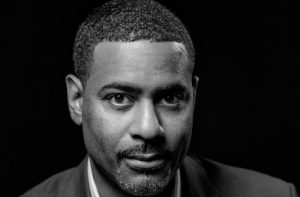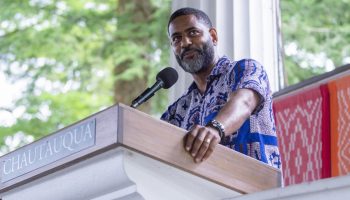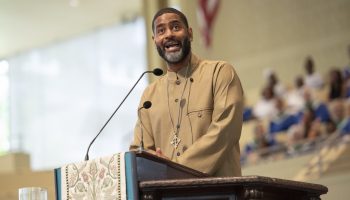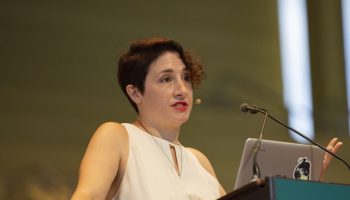As senior pastor of Trinity United Church of Christ in Chicago, the Rev. Otis Moss III leads more than 8,500 congregants MOSS in prayer and worship. Within this role, he preaches for racial equality and calls attention to issues like mass incarceration and environmental destruction.
 At 2 p.m. Monday, July 23, in the Hall of Philosophy, Moss will deliver the first interfaith lecture for Week Five, “The Ethics of Dissent.” This week focuses on effective ways to dissent and the moral implications behind disagreement.
At 2 p.m. Monday, July 23, in the Hall of Philosophy, Moss will deliver the first interfaith lecture for Week Five, “The Ethics of Dissent.” This week focuses on effective ways to dissent and the moral implications behind disagreement.
Moss, who received a doctor of ministry degree from Chicago Theological Seminary, has used his role as a pastor to voice opposition against what he deems unfair.
“TUCC has been a proponent and premier institution in speaking about liberation theology,” he said in an interview with Jet magazine.
“We have to speak for those in South Africa. We have to raise questions about racism, mass incarceration and if the church doesn’t do it — who will?”
-The Rev. Otis III, Senior pastor, Trinity United Church of Christ
Moss is a seasoned speaker, lecturing at college campuses and churches around the world. He is the former pastor of the Tabernacle Baptist Church in Georgia and the author of Blue Note Preaching in a Post-Soul World: Finding Hope in an Age of Despair.
In both his sermons and writing, Moss reflects on popular culture. At Chautauqua, he will share how the Marvel comic “X-Men” exists as a symbol of the civil rights movement, and how it functions as a tool for dissent.
This past year, after the release of the Marvel movie “Black Panther,” Moss recognized a triumph for African-Americans.
“We all know the hit film ‘Black Panther’ has struck a collective chord, offering a complex and compassionate rendering of people of African descent through the lens of Afro-futurism,” he wrote in an oped for the Chicago Sun Times. “Afro-futurism, a term coined by scholar Alondra Nelson, describes artistic engagement where people of African descent break free of racialized limitations by creating new possibilities through art, literature, music and film; with people of color as central agents for human flourishing.”
In his personal life, Moss said he draws inspiration from his father, American pastor Otis Moss Jr., and the Rev. Martin Luther King Jr., who was a close friend of his father.
“Our greatest prophet produced in the 20th century was Dr. Martin Luther King, Jr.,” Moss said to Jet. “There is no other preacher that has the impact. He preached a liberation theology that spoke to the issues of the day and deeply related to the Bible. He called us to personal and public account. … How do we create world and society and community in line with the world of God?”
Though he has several role models, Moss has developed his own style of preaching that speaks to both his immediate community and the global community. In addition to objecting to racism and discrimination, Moss said he intends to send a message that his congregation is “unashamedly Black.”
“Every race has been given space to celebrate their uniqueness culturally except African-Americans,” he said to Jet. “Black people are the only people who have been denied of saying ‘God made us African descent and there is nothing wrong with who we are, our culture or the shape of our nose. God made us who God made us to be…’ If the Irish and the Greek and the Polish are unashamed — why should we be ashamed?”
As a board member at Auburn Seminary and chair of the board of directors the Faith in Place Action Fund, Moss believes in translating his preaching into action through outreach ministries.
“Incarceration is a huge prison ministry — that’s one of our premier ministries,” he told Jet. “We do the typical visits and pray with people and bring people to Christ. We also do advocacy through The Next Movement. We are working on removing the stigma or laws that hurt our returning citizen population.”
Moss, who came to Chautauqua in 2016 as a visiting pastor, will also share his personal experiences as an activist and person of faith during his interfaith lecture.




